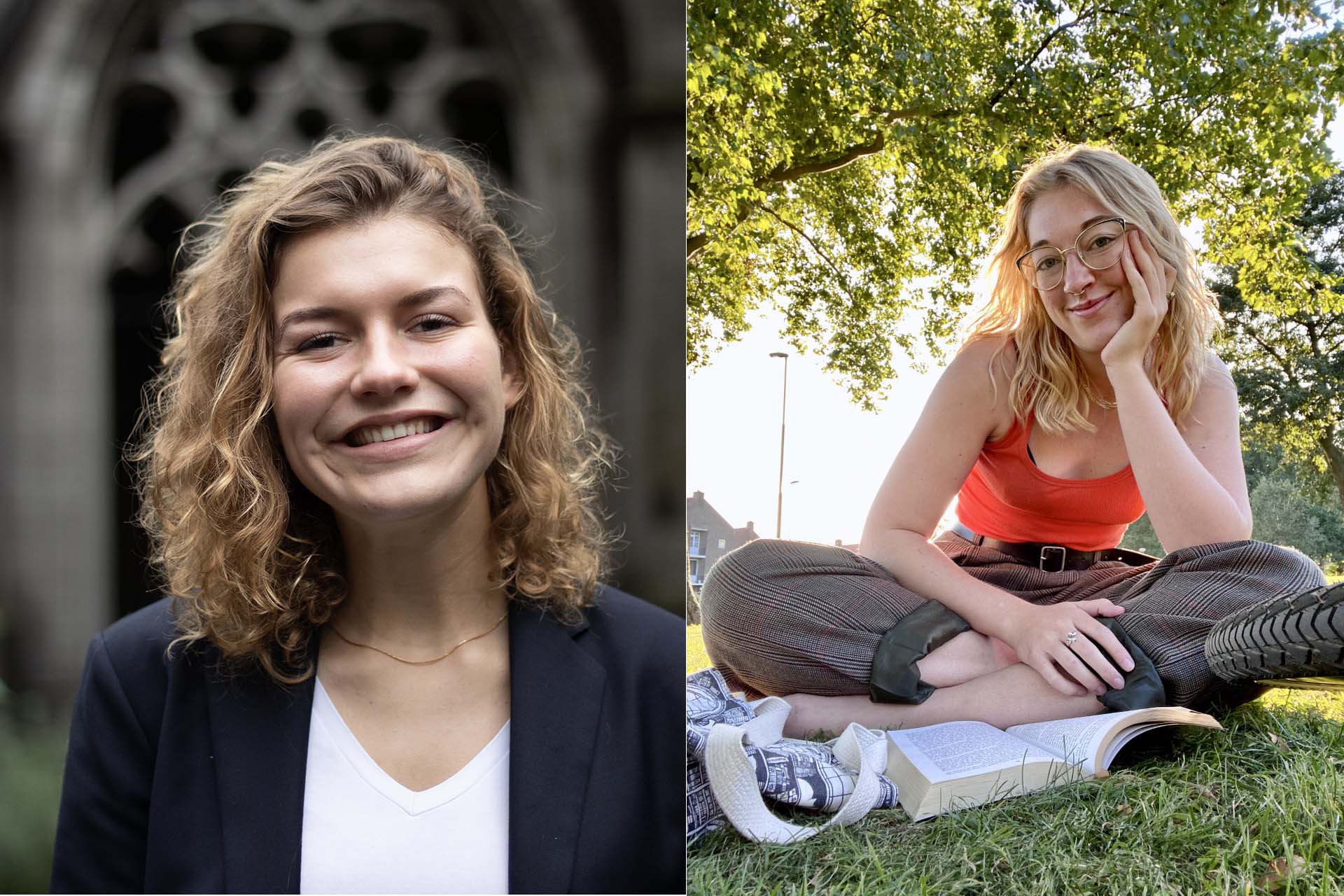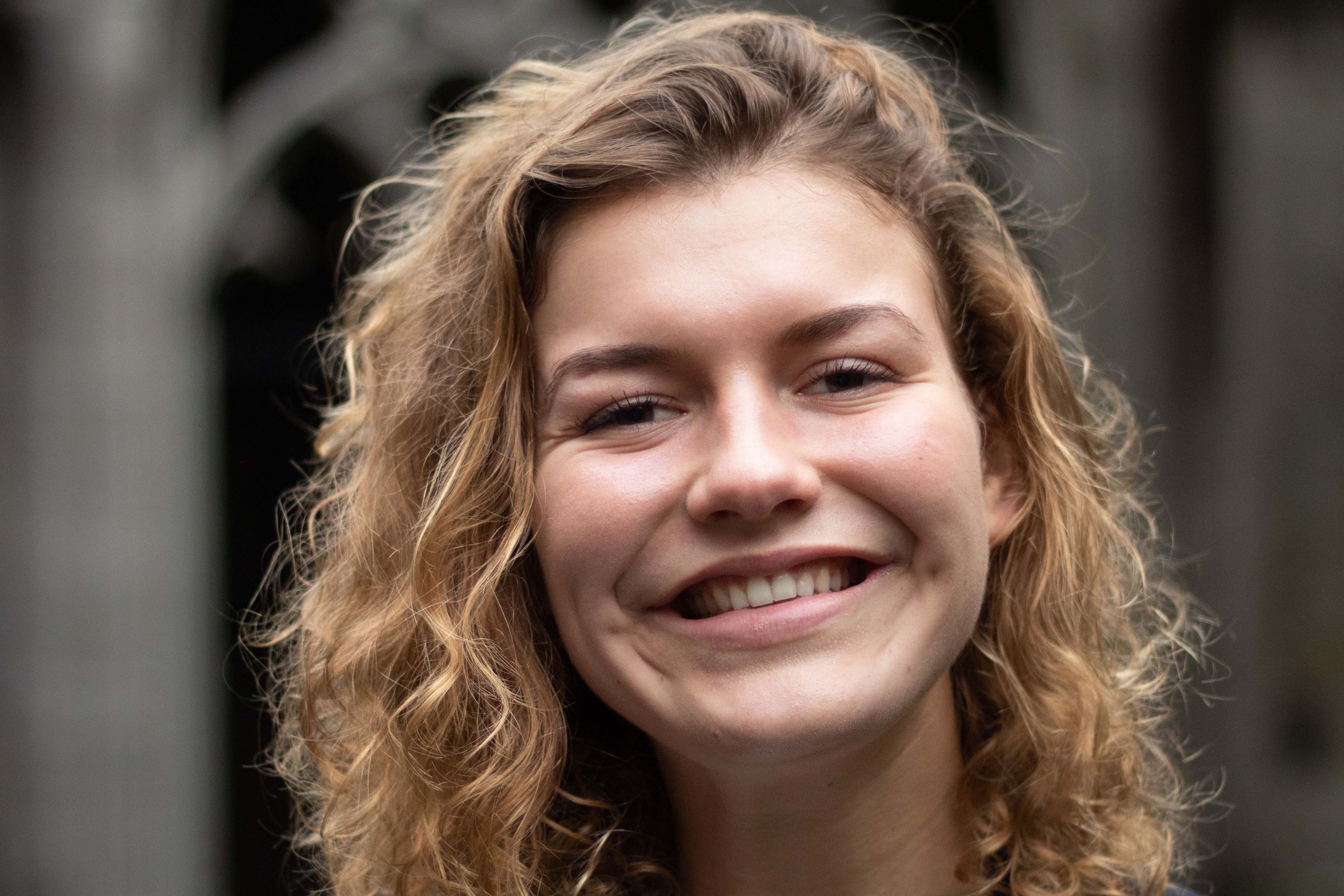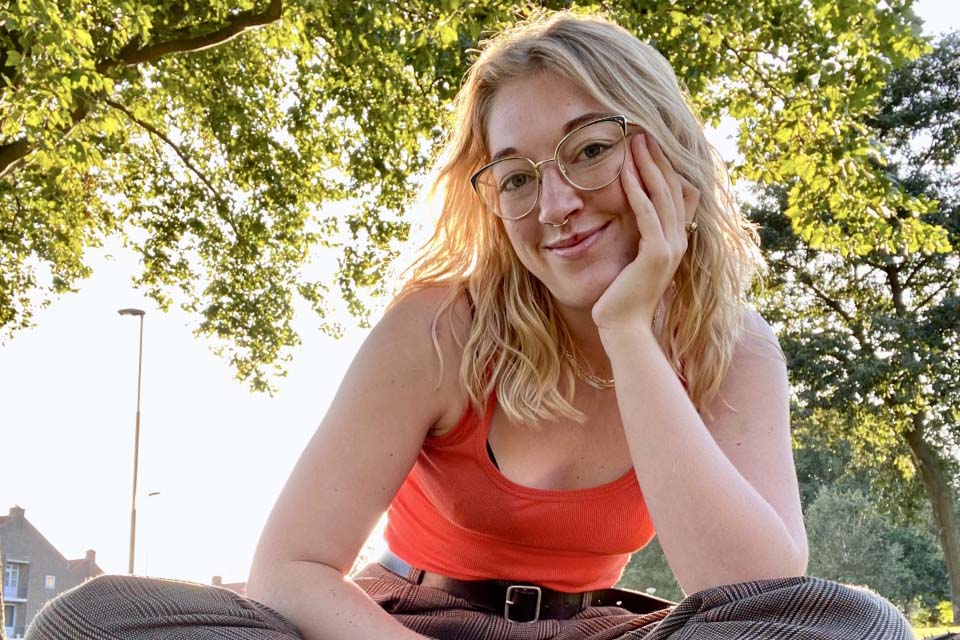The International Master’s in Advanced Research Criminology (IMARC) is a prestigious two-year MA programme delivered by a consortium of three European universities: Erasmus University Rotterdam, Ghent University and the University of Kent. IMARC brings together experts in the field of international criminology and attracts many top international students to SSPSSR. The programme prepares students for the current demands in the field of border crossing, security and social justice, addressing these issues from a European and global perspective.
Maartje Schrauwen
Before beginning the IMARC, Maartje completed an undergraduate degree in interdisciplinary social sciences at the University of Utrecht in the Netherlands. As all IMARC students do, Maartje spent the first semester of the programme at the Erasmus University Rotterdam (EUR) where she studied a number of theoretical and methodological modules.
Can you tell us why you chose to study the IMARC programme?
During my studies at the University of Utrecht, I found out that criminology is a discipline where a lot comes together. The field is exciting, and the discipline offers many interesting ways to look at all social aspects of society. Criminology offered me the opportunity to continue to think broadly, but at the same time to delve deeper into a specific theme. It is a relatively new discipline in which you can go in many directions, and I have noticed that many people find it interesting to discuss crime related topics with me. When I discovered the existence of the IMARC program, (which was fairly new), it immediately caught my attention because of its small scale and focus on research. It offers me all the tools to further develop my own criminological interests while being supported by teachers working at different universities, all with their own vision.
You studied your first semester at EUR – can you tell us what that experience was like for you?
It was exciting and pleasant. Erasmus is known as a good university and that is how I experienced it. The campus is grand and impressive, and I enjoyed experiencing a different university culture after four years of study in Utrecht. Despite the pandemic and the difficulties it presented for social activities, my IMARC cohort quickly felt like a warm, cosy nest. Given our small group, we were allowed to follow physical lessons for a long time, which I was very happy with. Although the first semester was tough (and I realised that a postgraduate program brings considerably more workload than I was used to in my undergraduate studies), I felt well supervised and knew that the teachers were there for us when we faced problems.
For your second semester, you’re required to choose one of three tracks. Can you tell us what motivated you to choose the UKent track?
It is quite exceptional that the IMARC programme offers so many options – everyone follows a self-composed study path. Even before I started my Master’s, I had a fascination with the prison system and this continued to grow during the first semester. The Kent track offered a module called Prisons and Penal Policy, a course that naturally appealed to me. In addition, the Kent track had a critical criminology approach that emerged in all subjects, which I found very interesting.
I had the option to choose two further modules; the second module that caught my attention was Terrorism and Modern Society. I had little knowledge of terrorism and its related theoretical frameworks, and it turned out to be fascinating. As a third module, I decided to take Sociology of Violence, a course that covered all kinds of different topics and where the work groups ranged from discussions about uprisings in prison to sifting through the work of Hannah Arendt. I thought it was an interesting experience to take modules with mainly English and some international students.
The work environment was of course not what it could have been – I would have loved meeting my teachers and fellow classmates in real life. Nevertheless, there is also an online format in which conversations take place, although I have the impression that English students are a lot more reserved than I was used to from my Dutch classmates. I lived in a house with two of my fellow students from IMARC, which often led to discussions about terrorist attacks and prison sentences over a plate of pasta and a well-deserved beer.
What’s it been like to study one course at two different universities?
It is very interesting to take up courses at another university, in another country. Wherever you are, everyone is open to conversation and it is very valuable to discuss topics of importance on a global scale with people from different cultures and backgrounds. The transition went fairly smoothly, although I am unfortunate that Brexit caused some confusion around a visa that I suddenly turned out to need.
What have been the highlights of the experience overall?
Despite the weird times we are living in I feel like I had a cool experience. I moved in with two IMARC fellow students in a student house. Three other IMARCers lived on the same street, so we formed a small and cosy community and enjoyed little picnics in the park and endless city strolls together. I explored the beautiful surroundings of Canterbury on foot and by bike and enjoyed my walks to the postgraduate building where I spent many hours studying with a cup of tea. I will be back soon to discover the English pub, because having missed that opportunity, it feels like a great loss!
What has impressed you most about our academic staff?
I had a really nice experience with the English teachers. Dr Rachel Seoighe is a fantastic activist teacher who motivates students to dive into the subject matter. Dr Simon Cottee was an inspiring teacher and writer with a tremendous amount of knowledge, and I came across several of his articles on Vice and in the New York Times, which I thought was pretty cool. Professor Larry Ray is a teacher who has written a fantastic book that guided the profession, and I would like to thank him for letting me be part of his last class before retirement.
How have you found the experience of learning online?
I would be lying if I said I enjoyed having classes online. Discussions are simply more lively and engaging in real life than in an online meeting. However, I also enjoyed the comfort of following the workgroups in my bedroom and this also meant that I had a little less trouble grabbing my moments during the discussions.
For the third semester, you undertake fieldwork for your thesis – what will you choose and why?
Next year I will be doing fieldwork, where I will be conducting interviews with prison workers in the Netherlands. I have chosen this option so that I can really follow my own interests without being tied to an organisation that has certain expectations of me. With the fieldwork, I hope to get a glimpse behind the scenes of the Dutch prison system and to put together a nice dissertation project.
The fourth semester is dedicated to writing your Master’s thesis – can you tell us about the topic you have chosen?
I am going to write my thesis about the translation of penal policy into practice in Dutch prisons. Penal policy changes over time and is often complicated and paradoxical in nature. The people that form the link between policy and practice fulfil an important role in the functioning of the prison system. Even though penal policy and prisons are widely researched; little is known about how prison staff make sense of and negotiate penal policy. With my thesis, I aim to explore the role that prison staff play in translating Dutch penal policy into working practice, and to shine a light on the real impact of prison policy behind the walls of the prison.
Have you felt well supported in your learning and research?
Yes definitely. I have a great supervisor, Dr Marisa Silvestri. She really takes the time to work with me and guides me with a lot of passion. I have only just started my research, I submitted my research proposal two weeks ago, but I am really looking forward to getting started next year.
What’s next for you after you graduate?
I am reasonably confident that I want to continue working in the research field and I am considering the option of doing a PhD. I think I want a temporary job after my Master’s, perhaps as a research assistant or something along those lines. That has mainly to do with the plan to go hiking for eight months in 2023, from Utrecht to Istanbul, together with my boyfriend who is also a hiking freak. After that, I will dive back into my role as a criminologist and start building a career!
Finally, what advice do you have for other students considering this programme?
If you are interested in criminology and enjoy doing research, this is one of the few programmes that meet these needs. There are several criminology Master’s available, but this programme offers good guidance and freedom of choice to do what suits you best. And I am really starting to feel at home in different research methods as well. I really found my passion in criminology, and I feel that I have room to develop myself in this program. IMARC is a very fun and challenging program and you will be at the right place at EUR and Kent!
Saskia Hennecke
Saskia Hennecke completed an undergraduate BA degree in Economics and Film at the University of Notre Dame in the US before beginning her IMARC studies at EUR and Kent.
Can you tell us why you chose to study the IMARC programme?
IMARC is a really unique program which allows students to study at three different universities and enjoy the experience and expertise of a really diverse cast of professors. I chose IMARC for the opportunity to get a truly international education and study with students from all over the world.
You studied your first semester at EUR – can you tell us what that experience was like for you?
I really enjoyed my time at Erasmus University Rotterdam. We were lucky enough to have nearly a full semester of in-person teaching, and the modules really prepared us for our research. Rotterdam is a beautiful and vibrant city, where I really hope to spend more time in the future.
For your second semester, you’re required to choose one of three tracks. Can you tell us what motivated you to choose the UKent track?
Kent is really known for taking a critical approach to criminology, and that suits my interests. We also had the opportunity to meet some of the professors virtually before finalising our track choices, and their descriptions of the culture here at Kent sounded really fantastic. They described it as a place where people really live to sit at the pub and spend hours debating papers. I can’t wait to get into that after Covid restrictions ease up a bit more!
What’s it been like to study one course at two different universities? What have you gained from this experience?
The blend of professors and cultures and international students IMARC offers has been a really fantastic and enriching experience. In many ways I can continue to rely on the classmates and professors I met at EUR, while also exposing myself to a whole new cohort of support. In fact, I’ll likely wind up with a supervisor at Kent, and co-supervisors from each of the other IMARC universities. In combination, they bring a richly diverse perspective and experience to my research.
What have been the highlights of the experience overall?
One of the highlights has definitely been the people I have met. The measure of any program or institution is really the people it attracts, and I have made some of the most incredible and talented friends along the way.
What has impressed you most about our academic staff?
In my experience, the staff have really treated us more as colleagues than subordinates. I often feel far more like I am a fellow researcher than a student, and I think that dynamic is really valuable as it is preparing me for a career in research and academia, while I still have all the support afforded to students.
How have you found the experience of learning online?
While learning online is unfortunate, it’s also not that bad. Professors are really eager and available to hop on a call and help guide you through a concept or decision. Of course, you miss out on a certain level of closeness and camaraderie that comes from just being out and about with classmates and professors, so I look forward to experiencing that in my second year.
For the third semester, you have a choice between a research-based internship or fieldwork for your thesis – what will you choose and why?
During our third semester, we’re all doing fieldwork research, but some have an internship with an organisation in order to access their data or collaborate with their research population. In my situation, I do not have an internship, but I will likely actually work with my partner organisation to develop the role of a research assistant for a Ugandan student/activist so that my research can be more participatory and collaborative.
The fourth semester is dedicated to writing your Master’s thesis – can you tell us about the topic you have chosen/will choose?
I’m taking a postcolonial, feminist approach in studying the criminalisation of queerness in Uganda. More specifically, I am conducting participatory action research in an analysis of the media environment around homophobia. In addition to my written dissertation, I’ll make a documentary which addresses the different forms of media and their influence and impact on homophobia and queerness in Uganda.
Have you felt well supported in your learning and research? What support have you been able to access?
I have definitely felt supported in my research. One of the things that happened that made me feel particularly supported is that as my research plans began to crystallise, my supervisor at the time actually realised that my topic would be better suited to a different supervisor, and she helped to switch me over even though it was not in her best interest. While both professors are amazing and brilliant people, my new supervisor is a better fit, and I have had the opportunity to learn from and alongside both people. You really know that your professors here have your best interest at heart.
What’s next for you after you graduate?
I’m still a while away from graduating, but IMARC has really made me want to pursue a PhD. I just see all of my incredible professors around me and doing really cool research, and I just think, yeah, I want to do that.
Finally, what advice do you have for other students considering this programme?
I couldn’t recommend IMARC more highly. Whether you’ve studied abroad before and crave more of that international perspective, or you have lived in one place your whole life and want to study further afield, IMARC is going to confront you to grow, change your perspectives, push you out of your comfort zone, and support you along the way.
About the IMARC programme
The International Master’s in Advanced Research in Criminology (IMARC) programme is designed to respond critically, scientifically and in a policy-oriented manner to social questions that have dramatically changed the agendas of crime, harm and control. It brings together learning, research and practice through collaboration with partners such as governments, NGO’s, corporate actors and other universities.
Course structure
- First semester: the programme starts at the Erasmus University Rotterdam, with a focus on international criminology in general and border crossing, security and social justice in particular. A strong methodological foundation is developed for research projects by completing a suite of methods modules
- Second semester: you choose a specialisation track at one of the three universities. The specialisation track at Kent is in ‘Theory, culture, power, and the global: How do phenomena of crime, harm, violence, control and transgression involve problems of inequality, injustice, and social and legal exclusion?’ The modules focus on policy responses with a greater attention to social justice, democracy, equality and rights
- Third semester: there is a choice between a research-based internship or fieldwork for your thesis. You start or continue you supervised research, for example through fieldwork, or a research internship (at one of IMARC’s network partner institutions), or desk-based data collection. It is possible to move to another university or location in the third semester for an internship or to do fieldwork for your thesis
- Fourth semester: this is completely devoted to writing your Master’s thesis and is the final part of the programme.You also take four research modules that develop the argument of your thesis from different perspectives: Globalisation, digitalisation and crime; Border crossing, security and social justice; Analysing criminal policies in a global perspective; Advanced research methods.
Learn more at: www.internationalmastercriminology.eu



